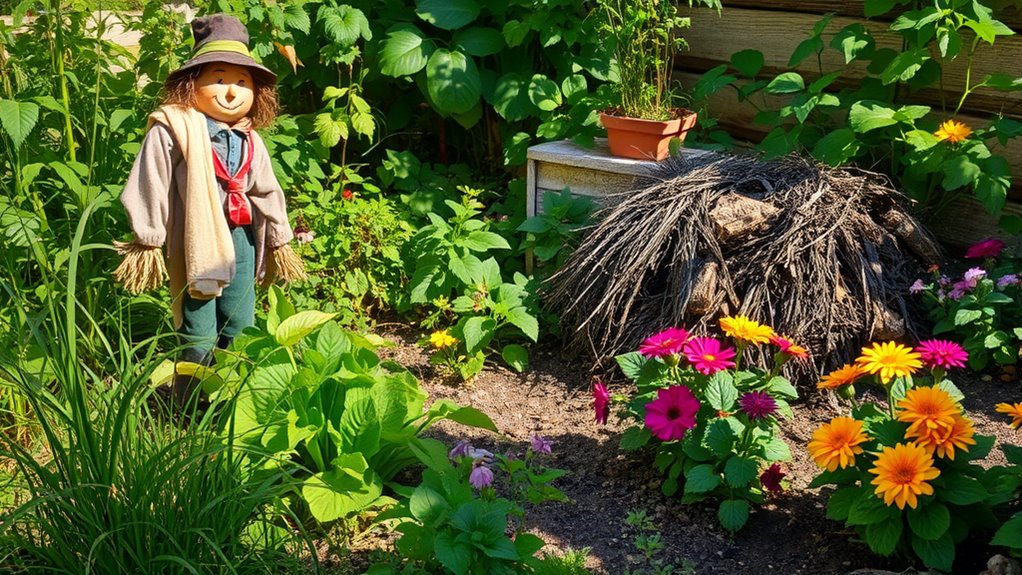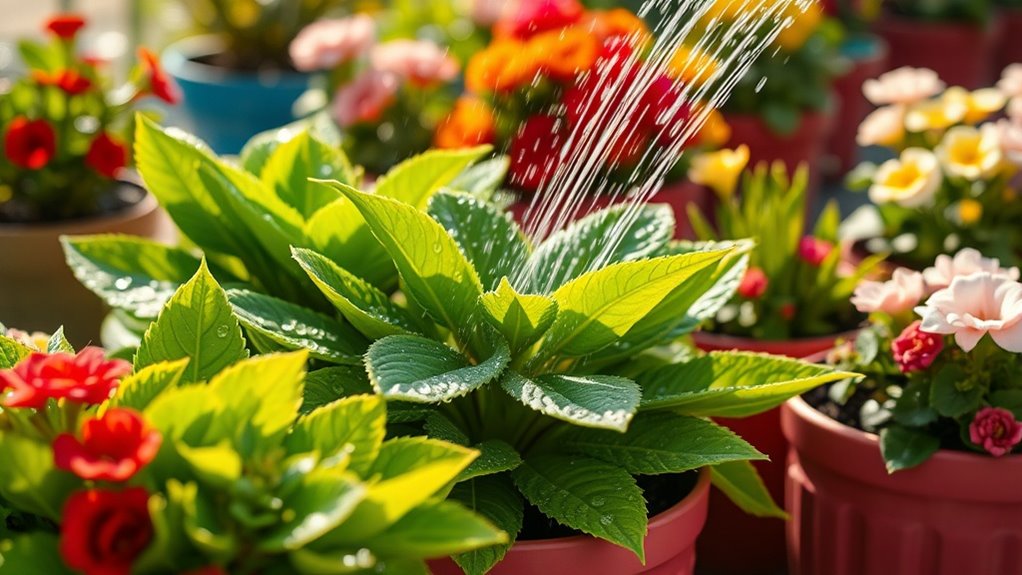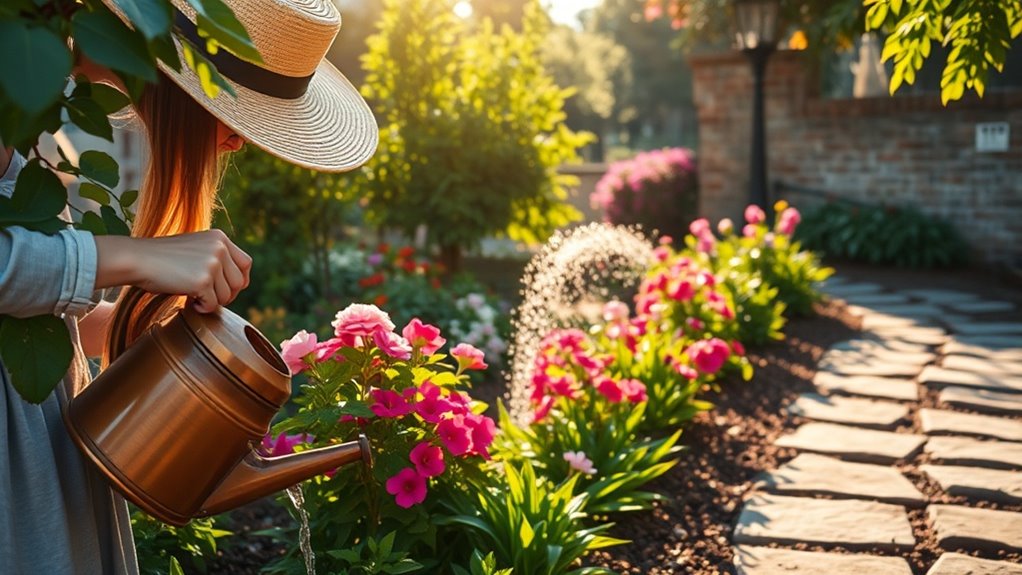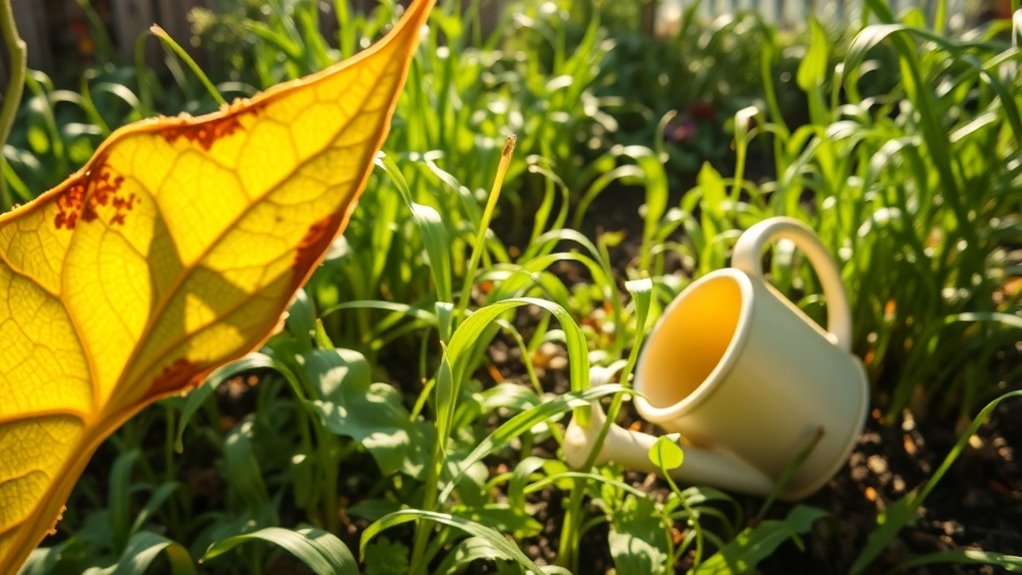Garden Myths That Are Wasting Your Time and Money
You might think that some common gardening practices are foolproof solutions for success, but many of these myths could be costing you time and money. For instance, over-mulching can lead to root rot, and coffee grounds aren’t the miracle fertilizer you hoped for. As you explore these misconceptions, you’ll find surprising truths that can transform your gardening approach. What if the key to a thriving garden lies in evidence-based strategies instead?
Key Takeaways
- Relying solely on mulch for weed control can lead to root rot if moisture is trapped; assess your plants’ needs first.
- Using coffee grounds alone as fertilizer may not drastically improve soil; they should be a supplement to balanced fertilizers.
- Believing all organic pesticides are safe can be misleading; careful application is necessary to protect beneficial insects and health.
- Watering in the evening promotes dampness and can cause fungal diseases; morning watering is generally more effective for plant health.
- Companion planting is beneficial but not a guaranteed solution; soil quality and proper care are more important for plant success.
Mulching Is Always Beneficial
Mulching is often touted as a universal solution for garden health, but it’s not always beneficial in every situation.
Many gardeners fall for false garden tips that recommend mulching indiscriminately.
While mulch can conserve moisture and suppress weeds, it can also trap excess moisture, leading to root rot in certain plants.
Additionally, using organic mulch inappropriately might attract pests or harbor diseases.
Before applying mulch, assess your plants’ needs, soil type, and local climate. Understanding proper mulching techniques can help you avoid common pitfalls and ensure your garden thrives.
Coffee Grounds Are a Miracle Fertilizer
Have you ever wondered if coffee grounds really deserve their reputation as a miracle fertilizer?
While they’re rich in nitrogen, potassium, and phosphorus, the actual benefits mightn’t be as significant as you think.
Simply adding coffee grounds to your soil won’t drastically improve plant growth.
They can improve soil structure and attract beneficial microbes, but their overall nutrient contribution is modest.
If you’re relying solely on coffee grounds, you might be disappointed.
Instead, consider using them as a supplement alongside a balanced fertilizer.
Maximize your garden’s potential by combining different organic materials for better results. Additionally, it’s essential to understand that soil nutrients need to be balanced for optimal plant health.
Organic Pesticides Are Always Safe
Many people believe that organic pesticides are completely safe, but that’s not always the case.
It’s crucial to understand that organic doesn’t mean risk-free; these products can still pose dangers to your health and the environment. Additionally, certain organic pesticides can be highly effective in eliminating pests quickly, which may lead to misuse or over-reliance on these substances.
Misconceptions About Organic Safety
What makes you think that organic pesticides are always safe?
While they’re derived from natural sources, that doesn’t mean they’re harmless. Some organic pesticides can be toxic to beneficial insects, pets, and even humans.
Just because a product is labeled “organic” doesn’t automatically guarantee it’s free from risks. You need to read labels carefully and understand the active ingredients.
Additionally, the application methods and dosages significantly impact safety.
Remember, all pesticides, organic or synthetic, require responsible use. Educate yourself about specific products to ensure you’re making informed choices for your garden and the environment.
Don’t assume; verify.
Understanding Pesticide Risks
While it’s easy to assume that organic pesticides are inherently safe, understanding the risks associated with their use is vital for effective gardening.
Even organic options can pose hazards if misused.
Here are some key considerations:
- Toxicity Levels: Organic doesn’t mean non-toxic; some can harm beneficial insects.
- Environmental Impact: Overuse can lead to soil and water contamination.
- Resistance Development: Pests can develop resistance, making them harder to control.
- Application Mistakes: Incorrect timing or dosage can reduce effectiveness or cause plant damage.
Watering in the Evening Is Best
Why do so many gardeners believe that watering in the evening is the best approach?
The idea is that cooler temperatures reduce evaporation, allowing water to soak into the soil.
However, watering at night can lead to prolonged dampness, promoting fungal diseases and root rot.
Instead, consider watering early in the morning when temperatures are still low, and plants can absorb moisture efficiently. This timing also allows excess water to evaporate during the day, minimizing disease risk. Additionally, watering in the morning aligns with an essential watering schedule, helping to optimize plant health.
Ultimately, while evening watering seems convenient, it often creates more problems than it solves, wasting your time and resources in the long run.
Companion Planting Guarantees Success
Does companion planting really guarantee success in the garden?
While it can offer benefits, it’s not a foolproof method.
Many factors influence plant growth, and relying solely on companion planting may lead to disappointment.
Consider these points:
- Plant Compatibility: Not all plants thrive together; some may compete for nutrients.
- Pest Management: Companion plants can deter pests, but it’s not a universal solution.
- Soil Quality: Healthy soil is crucial; companion planting won’t fix poor conditions.
- Climate: Environmental factors play a significant role in plant health, overshadowing companion benefits.
In essence, it’s a tool, not a guarantee. Additionally, choosing the right plant pairings can enhance flavor and improve overall yield.
Expensive Seeds Yield Better Plants
Are you tempted to invest in expensive seeds, believing they’ll guarantee superior plants?
While premium seeds often boast better genetic traits, the reality is that successful gardening hinges more on your care and environment than the seed price.
Many affordable seeds can yield robust plants if you provide proper soil, sunlight, and water.
Furthermore, local or heirloom varieties often thrive better in your specific conditions.
Instead of splurging, focus on improving your gardening skills and nurturing your plants.
In fact, proper care is often more crucial than the initial cost of seeds.
In the end, it’s not the price tag but your dedication that determines your garden’s success.
A Green Lawn Equals a Healthy Garden
Many people believe that a lush, green lawn signifies a healthy garden, but this isn’t always the case.
While a well-maintained lawn enhances your home’s aesthetic, it doesn’t guarantee the functionality and health of your garden plants.
Understanding the differences between lawn care and garden care can help you cultivate a thriving outdoor space. Additionally, garden health depends on various factors such as soil quality and plant diversity, rather than just the appearance of the lawn.
Lawn vs. Garden Health
While a lush, green lawn often seems like the hallmark of a healthy yard, it’s important to recognize that lawn health doesn’t always equate to a thriving garden.
A beautiful lawn can mask underlying issues that hinder your garden’s growth.
Consider these factors:
- Soil Quality: Lawns often require different nutrients than garden plants.
- Watering Needs: Overwatering your lawn can drown your garden plants.
- Pest Control: Lawn treatments might harm beneficial insects in your garden.
- Competing Plants: Grassy lawns can compete for space and nutrients with your flowers and vegetables.
Focus on the specific needs of both to ensure true garden health.
Aesthetic vs. Functionality
How often do we equate a manicured, green lawn with a flourishing garden? This belief can lead to wasted time and resources. A lush lawn may look appealing, but it doesn’t guarantee a healthy ecosystem. Understanding the balance between aesthetics and functionality is key.
| Aspect | Aesthetic Focus |
|---|---|
| Lawn Maintenance | Frequent mowing, chemical treatments |
| Plant Diversity | Limited to grass only |
| Soil Health | Neglected, compacted soil |
Instead of chasing the perfect lawn, prioritize diverse plants and healthy soil. A functional garden thrives on ecological balance, not just visual appeal.





